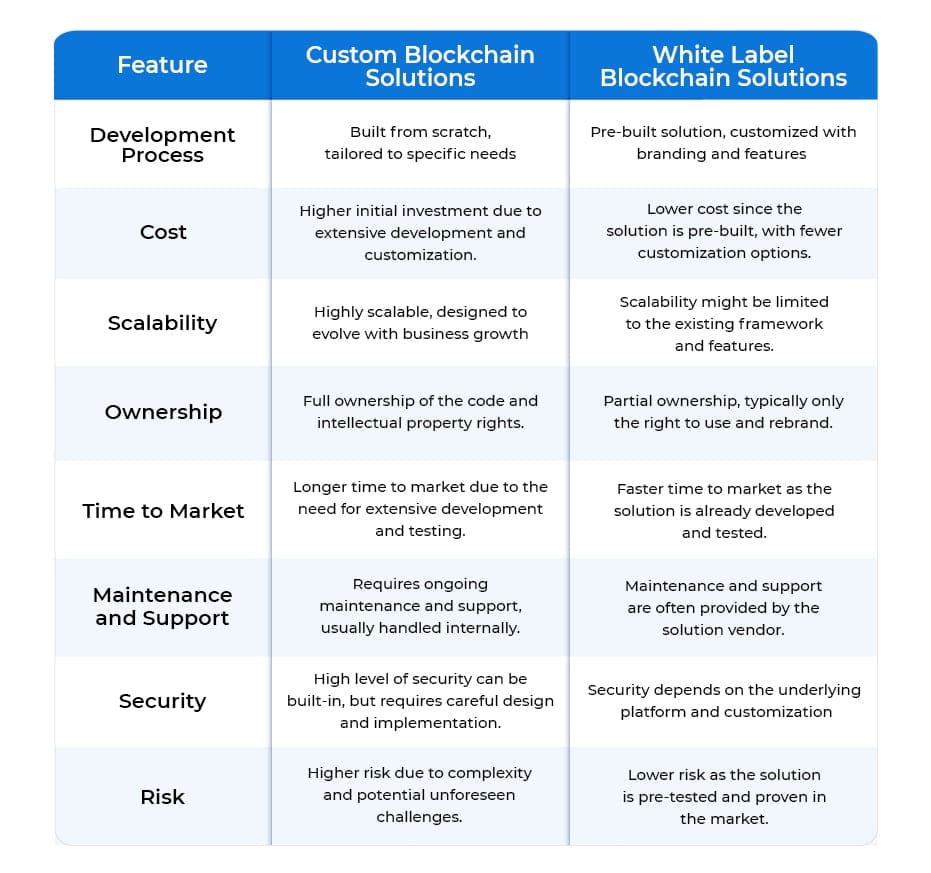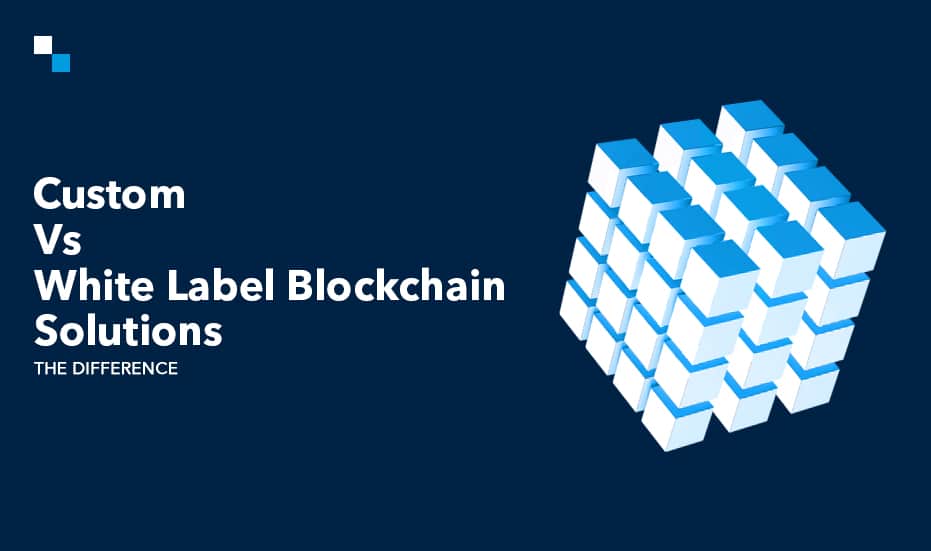
How to Navigate the Changing Global Regulatory Landscape of Asset Tokenization?
September 4, 2024
Evaluating the Cost-Effectiveness of USDT TRC20 Trust Wallet
September 5, 2024Having already witnessed significant hype, blockchain technology is set to see continued expansion in the coming years. According to Statista, the global market size for the blockchain is estimated to amount to 1000 trillion U.S. dollars by 2032. While businesses must capitalize on this growing trend, choosing between custom and white label solutions can be a complex decision. Understanding the key difference between custom and white-label blockchain solutions is vital to making an informed decision that aligns with business goals and resources. This blog unveils the key differences between custom and white label blockchain solutions and prominent questions to consider before choosing an ideal one for your business.
Custom vs White Label Blockchain Solutions: The Difference

Development Process
- Custom Blockchain Development: Involves building a blockchain solution from the ground up. This process is comprehensive and begins with in-depth consultations to understand business needs, followed by design, development, testing, and deployment. Custom solutions are tailored to specific requirements, enabling the incorporation of unique features, functionalities, and protocols that align with business objectives.
- White Label Blockchain Solutions: These are pre-built, ready-to-deploy platforms that can be quickly customized to a certain extent, usually in terms of branding and minor feature adjustments. The development process is streamlined, with the primary focus on configuring the existing framework to match the client’s branding and operational needs.
Cost
- Custom Blockchain Development: Typically involves a higher initial investment due to the extensive resources required for development, testing, and deployment. The cost is justified by the solution’s ability to meet specific needs, offering long-term value through tailored functionality and scalability.
- White Label Blockchain Platforms: Offer a more cost-effective option, as the core platform is already developed. The reduced cost is due to the limited customization and the shared use of a standardized framework. This option is ideal for businesses with budget constraints or those seeking a quick market entry without the need for extensive custom features.
Scalability
- Custom Blockchain Development: Provides unparalleled scalability, as the solution is designed to grow alongside the business. It can be expanded with new features, users, and transaction volumes, ensuring that the blockchain continues to meet evolving business demands.
- White Label Blockchain Solutions: While scalable, these platforms may face limitations depending on the underlying framework. Scalability is often restricted to the features and capacities predefined by the vendor, making it less adaptable to rapid growth or significant changes in business needs.
Ownership
- Custom Blockchain Development: Offers full ownership of the codebase and intellectual property. This means businesses have complete control over the blockchain, including the ability to modify, update, and integrate the solution as needed without vendor dependency.
- White Label Blockchain Platforms: Typically, ownership is limited to the right to use and rebrand the platform. The underlying code and intellectual property remain with the vendor, which may restrict businesses from making substantial changes or transferring the platform to another service provider.
Time to Market
- Custom Blockchain Development: The time to market is generally longer due to the comprehensive development and testing processes required to ensure that the solution meets specific business needs. While this approach takes more time, it results in a robust, fully customized blockchain solution.
- White Label Blockchain Solutions: Offer a significantly faster time to market, as the platform is already developed and tested. Businesses can quickly deploy the solution, making it ideal for those looking to capitalize on market opportunities without the delays associated with custom development.
Maintenance and Support
- Custom Blockchain Development: Maintenance and support are typically managed in-house or through a dedicated service agreement with the developer. This ensures that the solution remains up-to-date and aligned with the business’s evolving needs, but it also requires ongoing investment in resources.
- White Label Blockchain Solutions: Maintenance and support are usually provided by the vendor as part of the service package. This can be advantageous for businesses that prefer not to handle technical support internally, though it also means relying on the vendor’s schedule for updates and patches.
Security
- Custom Blockchain Development: Security protocols can be tailored to the specific needs of the business, ensuring that the blockchain solution meets the highest standards of data protection and regulatory compliance. This is especially important for industries dealing with sensitive information.
- White Label Blockchain Platforms: Offer standard security features, which may not be as robust or customizable as those in a custom solution. While adequate for many businesses, these platforms may not meet the stringent security requirements of highly regulated industries.
Risk
- Custom Blockchain Development: Involves higher risk due to the complexity and potential for unforeseen challenges during the development process. However, these risks can be mitigated through careful planning, experienced development teams, and thorough testing. The result is a solution that precisely meets the business’s unique needs and can offer significant long-term benefits.
- White Label Blockchain Solutions: Present a lower risk as they are pre-built and have been tested in real-world applications. The proven nature of these platforms reduces the likelihood of encountering significant issues post-deployment. However, the trade-off is reduced flexibility and potential limitations in meeting specific or future needs.

Key Questions to Consider Before Deciding on Custom or White Label Blockchain Solutions
When selecting between a custom or white label blockchain solution, consider these critical questions:
- What are the core functionalities I need from a blockchain solution?
- How important is customization and flexibility to my business?
- What are the specific use cases I want to address with blockchain technology?
- Do I have any existing systems or processes that need to be integrated with the blockchain?
- What is my budget for the blockchain solution, including development, maintenance, and ongoing costs?
- What is my desired time to market for the blockchain solution?
- Do I have a preferred timeline for implementation?
- How much control do I want over the blockchain solution, including its development, maintenance, and updates?
- Are there specific branding or customization requirements I have for the blockchain solution?
- Do I need the ability to make changes to the blockchain solution in the future?
- Who will be responsible for the ongoing maintenance and support of the blockchain solution?
- What level of support do I need from the blockchain provider?
- Are there any ongoing costs associated with maintenance and support?
- What are the potential risks associated with developing or implementing a custom blockchain solution?
- How can I mitigate the risks associated with a white label blockchain solution?
- What is the long-term viability of the blockchain platform I am considering?
- How do I anticipate my business growing in the future, and can the blockchain solution accommodate that growth?
- Can the blockchain solution be easily scaled up or down as needed?
- Are there any limitations or constraints on the scalability of the blockchain solution?
Conclusion
The decision between custom vs white label blockchain solutions hinges on the specific requirements and resources of a business. Custom blockchain development offers maximum flexibility, scalability, and ownership, making it ideal for businesses with unique needs and the resources to invest in a tailored solution. On the other hand, white label blockchain platform provide a cost-effective, quick-to-market solution with reduced risks, making them suitable for businesses looking for a ready-to-use platform that requires minimal customization. By understanding these key differences, businesses can choose the blockchain solution that best aligns with their strategic goals.
Antier, a global leader in blockchain consulting and development, offers both custom and white label blockchain solutions to cater to a wide range of industries and business models. Antier’s dual offering of custom and white label blockchain solutions positions the company as a versatile and trusted partner for businesses of all sizes. Whether you’re a startup looking to enter the market quickly with a white label solution or an established enterprise seeking advanced blockchain development services, Antier provides the expertise and resources needed to achieve your goals.



